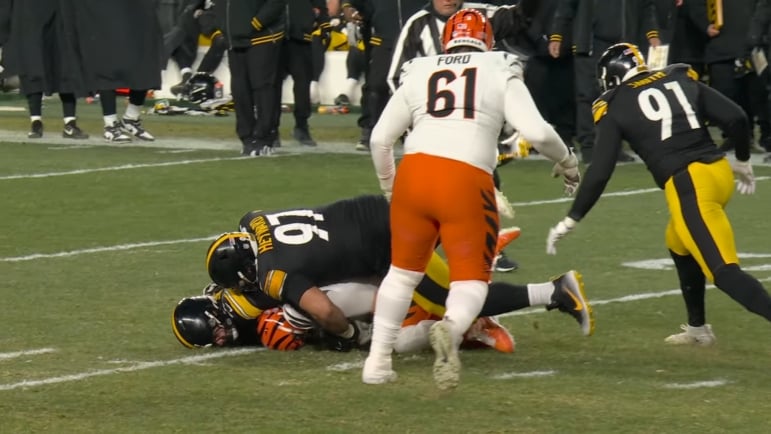Player: DL Cameron Heyward
Stock Value: Up
Reasoning: Cameron Heyward wrapped up another excellent regular season, making the Pro Bowl once again. Even while battling the flu, he finished the season strong in the finale, including three batted passes. He is still battling that illness, though, as the Steelers prepare for their first playoff game. Heyward hopes it won’t be their only one—or his last.
At this time a year ago, it’s fair to say Cameron Heyward had many skeptics. Hell, they were still around in August and September, and some even longer than that, I’m sure. But there is no doubt the skeptics lost this round; Heyward clearly proved he isn’t done.
Though it wasn’t a season-ender, Cameron Heyward played through injury in 2023.3 He missed six games, and the injury clearly affected his performance. That he was also due for a contract extension the following offseason, and he was vocal about wanting it, didn’t help tamp down the outside voices questioning him. He was about to turn 35, after all, and didn’t put up numbers, so what could he have left?
Well, the Steelers rolled the dice on Heyward, and so far, they’re winning. Heyward started every game in 2024, recording 71 tackles with 12 for loss. He added eight sacks, 20 QB hits, and a career-high 11 batted passes.
Although he fell a bit short of double-digit sacks (for a fourth time), Heyward had a very good year. He has already made the Pro Bowl, and an All-Pro nod is likely. Were it not for Joe Burrow, he would have also stood a good chance of winning the NFL Comeback Player of the Year Award.
The thing is, of course, that the season isn’t over. Cameron Heyward has played for the Steelers for 14 years. In that time, he has only experienced three playoff wins, has played in just one of them. He was injured when the Steelers won two games in 2016. You know how hungry he is, and I don’t think the flu is going to stop him from playing his best game on Saturday against the Ravens.
As the season progresses, Steelers players’ stocks rise and fall. The nature of the evaluation differs with the time of year, with in-season considerations being more often short-term. Considerations in the offseason often have broader implications, particularly when players lose their jobs, or the team signs someone. This time of year is full of transactions, whether minor or major.
A bad game, a new contract, an injury, a promotion—any number of things affect a player’s value. Think of it as a stock on the market, based on speculation. You’ll feel better about a player after a good game, or worse after a bad one. Some stock updates are minor, while others are likely to be quite drastic, so bear in mind the degree. I’ll do my best to explain the nature of that in the reasoning section of each column.








